Results 1 to 10 of 14
Thread: Horn scales restoration
-
02-20-2025, 04:13 PM #1Senior Member

- Join Date
- Apr 2024
- Location
- La Junta Colorado
- Posts
- 218
Thanked: 2 Horn scales restoration
Horn scales restoration
Is there a way to repair (build up) horn scales that are chipped or peices broken out on the edges? Or is the best thing to do sand them down even and reshape?
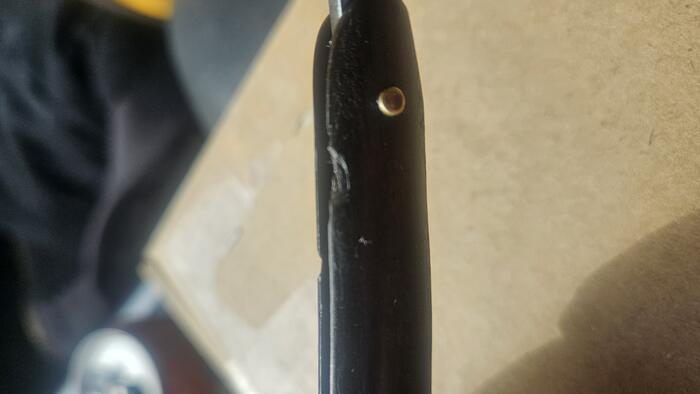
And is there a wax or some thing to put on them after you oil and buff them to make them look new as possible?
-
02-20-2025, 05:14 PM #2Senior Member


- Join Date
- Jun 2013
- Location
- Pompano Beach, FL
- Posts
- 4,046
Thanked: 636
You can fill the voice with epoxy mixed with black paint.
Or you can cover void on outside with black electric tape. Put a layer of superglue. When dry add layer of black paint. Then fill the rest with superglue.
After either process sand and polish.
-
The Following User Says Thank You to bouschie For This Useful Post:
Cattleman02 (02-20-2025)
-
02-21-2025, 11:38 AM #3

Super glue won't dye and paint won't stay. Epoxy and horn dust or saw dust will though. Do a search or a breeze through the "what are you working on," thread in the workshop. There are lots of posts there about horn repair.
Iron by iron is sharpened, And a man sharpens the face of his friend. PR 27:17
-
The Following 2 Users Say Thank You to PaulFLUS For This Useful Post:
Cattleman02 (02-22-2025)
-
02-21-2025, 03:03 PM #4Senior Member


- Join Date
- Feb 2018
- Location
- Manotick, Ontario, Canada
- Posts
- 2,811
Thanked: 562
You can mix CA glue with bog oak dust (hard to get) or dust from sanding the horn, but I’ve also had success mixing CA glue and graphite (available at most hardware stores). The black graphite pretty closely matched the black horn I was patching.
David
“Shared sorrow is lessened, shared joy is increased”
― Spider Robinson, Callahan's Crosstime Saloon
-
02-21-2025, 03:33 PM #5

The good thing about horn is it is easy to experiment with. The bog oak dust/epoxy works a treat.
Before that came on the scene, I used bits of hard rubber and Bakelite to create dust for repairs.
Grafting pieces for broken parts and bug damage with CA is not so hard. Horn is Keratin and CA sticks it permanently.
Found this old razor I did a long time ago...https://sharprazorpalace.com/custom-...d-marsden.html"Don't be stubborn. You are missing out."
I rest my case.
-
The Following User Says Thank You to sharptonn For This Useful Post:
Cattleman02 (02-22-2025)
-
02-22-2025, 04:28 PM #6

Either can be done successfully. I just personally prefer epoxy.
The nice thing about epoxy is it is more workable. CA doesn't flow or fill in as easily. CA won't take dye so if the color of your patch doesn't match you can't adjust it with dye. Plus mixing it with any fibrous material is harder because it dries so quickly that it is harder to mold.
On the other hand. Epoxy looks more glossy than CA. Adding a fiber like saw dust helps but it is not as close a match as CA. CA has a more matte finish and if you do get the color matched right it is harder to recognize the patch, if that's your goal. For me a patch is like autobody repair. The goal is to not even see it has been repaired, like it was made that way.Iron by iron is sharpened, And a man sharpens the face of his friend. PR 27:17
-
02-22-2025, 05:41 PM #7

Horn is fun to work with, so many things that can be done, to bring them back to life. At least in my experienced, experiments.
Definitely look into the workshop thread, what are u working on. I have tons of tips in there, on this subject.
I've repaired many of scales, with missing pieces, using epoxy and Bog oak, but I've found that by grinding lump charcoal from my smoker, has better results, to the final finish. But if u want high shine, you'll have to top coat it with a thin layer or two, of CA. Then sand and polish.
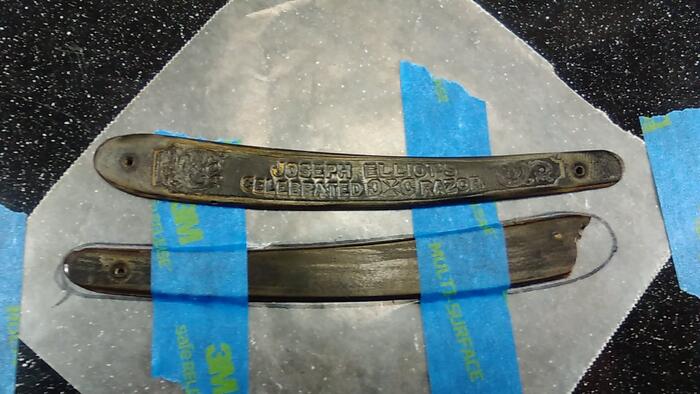
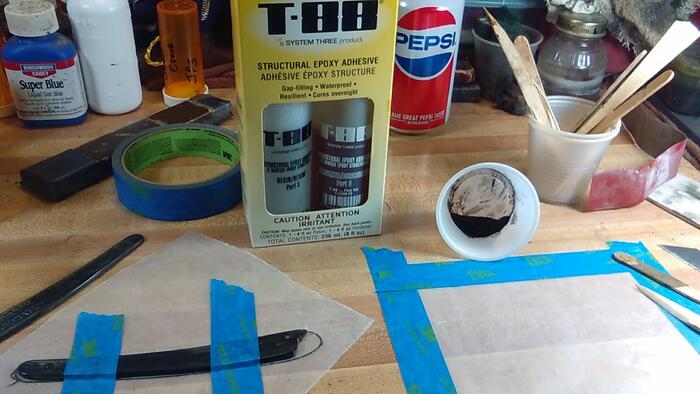
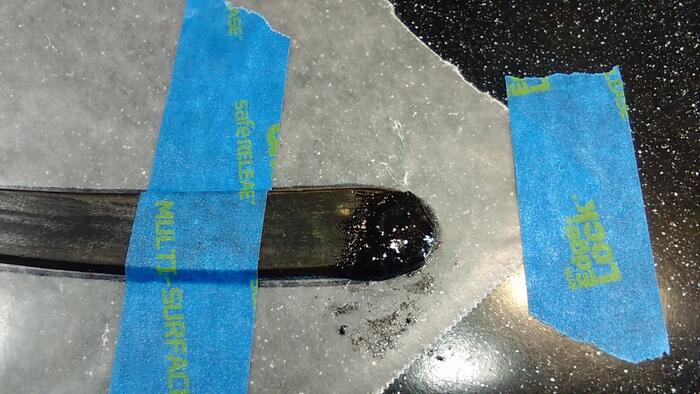
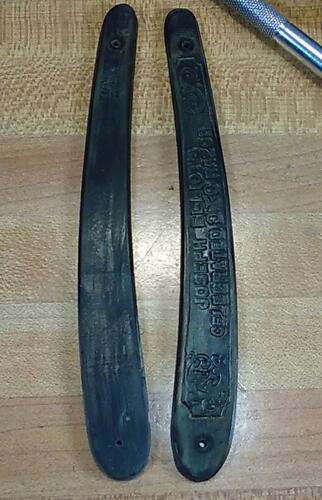
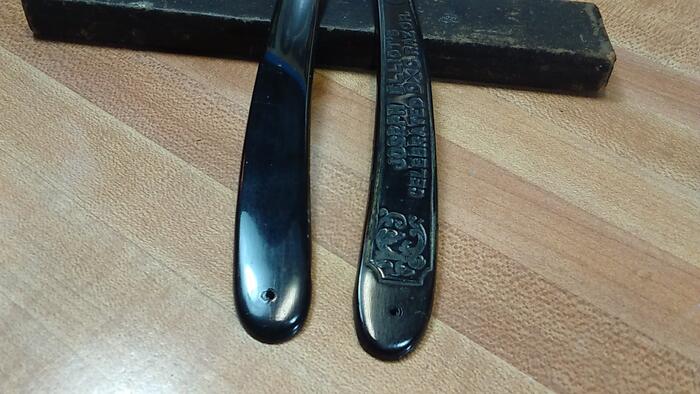
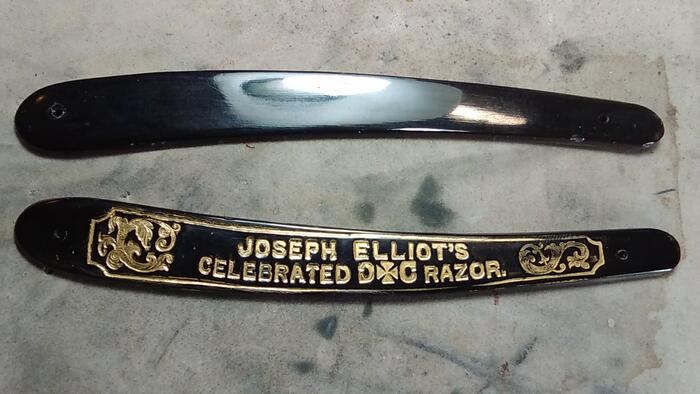 Mike
Mike
-
02-22-2025, 05:42 PM #8

Horn is fun to work with, so many things that can be done, to bring them back to life. At least in my experienced, experiments.
Definitely look into the workshop thread, what are u working on. I have tons of tips in there, on this subject.
I've repaired many of scales, with missing pieces, using epoxy and Bog oak, but I've found that by grinding lump charcoal from my smoker, has better results, to the final finish. But if u want high shine, you'll have to top coat it with a thin layer or two, of CA. Then sand and polish.





 Mike
Mike
-
02-22-2025, 09:50 PM #9

Yeah, I was looking for a post that I did where I used charcoal mixed with live oak saw dust, which is like bog oak, in that it is very, very dark brown.
Sometimes, because all horn is slightly different, graphite looks too gray and charcoal looks too black, where adding that little bit of brown in gives just that slight hue of brown. Plus it makes it look more fibrous and knocks down some of that shinyness.Iron by iron is sharpened, And a man sharpens the face of his friend. PR 27:17
-
02-22-2025, 10:01 PM #10

Everyone has a preference. As far a attaching 2 pieces of horn together I would only use superglue and not epoxy. It literally melts the 2 pieces together creating a bond that is usually stronger than surrounding areas. Epoxies are great for filling as they cure slower, allowing for more time to work with it.
Each to their own and as I stated, experiment and see what works best for you."Don't be stubborn. You are missing out."
I rest my case.


 23Likes
23Likes LinkBack URL
LinkBack URL About LinkBacks
About LinkBacks






 Reply With Quote
Reply With Quote

